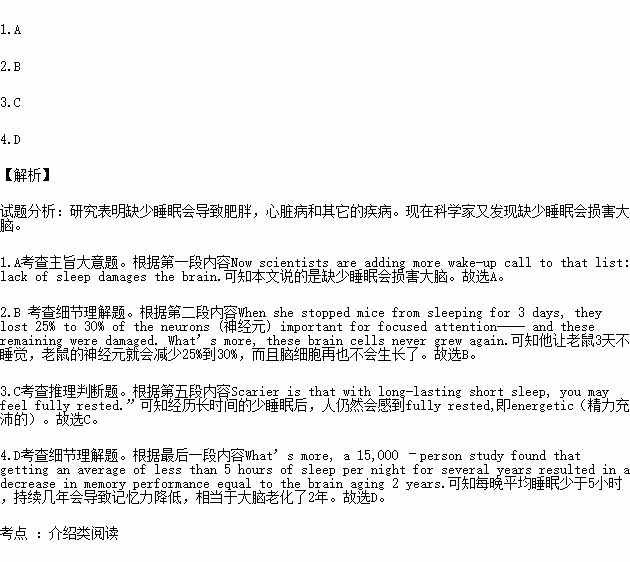题目内容
Sleep is just as important as diet and exercise, and not getting enough sleep can lead to obesity, heart trouble and other health problems. Now scientists are adding more wake-up call to that list: lack of sleep damages the brain.
People who regularly have trouble falling asleep and staying asleep (one study drew the line at 6.8 hours ) show changes in brain-----actual shrinking(缩小),in some cases--- in area important for memory and problem solving.
“We’ve always believed that we can take the weekend to catch up and be fine,” says Sigrid Veasey, a researcher in University of Pennsylvania, but that may not be the case. When she stopped mice from sleeping for 3 days, they lost 25% to 30% of the neurons (神经元) important for focused attention---- and these remaining were damaged. What’s more, these brain cells never grew again.
Clearly, something important is happening while we sleep, but exactly what sleep does for the brain has been a mystery. That’s why scientists got excited when researchers at the university of Rochester Medical Center recently offered a new theory. While observing the brains of sleeping mice, they discovered a kind of brain-cleaning system that clears away neural waste, the buildup of which is connected with Alzheimer’s.
In another study, young healthy people whose sleep was limited to 7 hours per night for one week showed damaged brain function. Scarier is that with long-lasting short sleep, you may feel fully rested. When study subjects were limited to 4 hours of sleep for 5 days, they reported feeling very tired following the first night but they didn’t get any sleepier after that.
What’s more, a 15,000 –person study found that getting an average of less than 5 hours of sleep per night for several years resulted in a decrease in memory performance equal to the brain aging 2 years.
Have we persuaded you to turn in early tonight ? Excellent.
1.The text is mainly about _________.
A. how lack of sleep damages our brain.
B. why we feel rested without enough sleep.
C. how much sleep we should get every day.
D. Why we have trouble falling asleep sometimes.
2.Sigrid Veasey’s research shows that ________
A. lack of sleep doesn’t affect our attention.
B. damaged brain cells can not recover.
C. sleeping on weekends can make up for lost sleep.
D. most neurons will die if we sleep poorly for 3 days.
3.According to paragraph 5, after several days of short sleep people may feel _________.
A. tired B. sleepy
C. energetic D. angry
4.According to the 15,000-person study, lack of sleep may cause ___________.
A. heart trouble B. obesity
C. death D. memory loss

